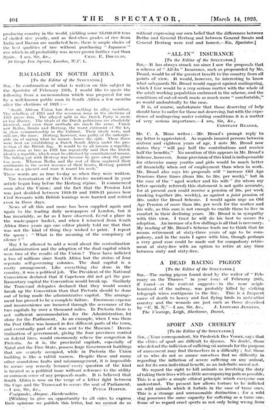RACIALISM IN SOUTH AFRICA
[To the Editor of the SPECTATOR.] SIR, – In confirmation of what is written on this subject in the Spectator of February 28th, I would like to quote the followinf_r froni a memorandum which was prepared for me by a well-known public man in South Africa a few months after the elections of 1921 :- " South African Union has done nothing to allay racialism. The rebellion of 1915 and the secession issue in the elections of 1921 prove this. The alleged split in the Dutch Party is more or less illusive. The ideals of the Dutch politicians are absolutely identical, and even their methods are much the same. Union saw Botha, Smuts and Hertzog, the worst extremist of the lot, in close companionship in the Cabinet. Their ideals were, and still are, the same. Hertzog, howeVer, was guilty of the unforgiv- able sin of saying what he meant—hence the split. These three were bent on establishing a Dutch South Africa under the pro- tection of the British flag. It would be to all intents a republic. Smuts even as late as 1921 has repeatedly said that the Dutch ideal is a republic, which must be obtained by constitutional means. The falling out with Hertzog was because ho gave away the game too soon. Whereas Botha and the rest of them engraved their sentiments in the secret recesses of their hearts, Hertzog printed them on a placard and wore it round his neck."
These words are as true to-day as when they were written.
The terrorization of the Civil Service mentioned in your article began long before the Hertzog regime. It commenced soon after the Union; and the fact that the Pension List was just doubled between 1918-19 and 1919-21 proves how Civil Servants with British- leanings were harried and retired even in those days.
News of all this and more has been supplied again and again to the leading daily newspapers of London, but it has invariably, so far as I have observed, found a place in the waste-paper basket, and when I returned from South Africa three years ago one editor plainly told me that that .
was not the kind of thing they wished to print. I repeat the query : " What is the meaning of the conspiracy of silence ? "
May I be allowed to add a word about the centralization of administration and the adoption of the dual capital which• were two of the results of the Union ? These have inflicted a loss of millions since South Africa lost the status of four separate self-governing colonies. The dual capital is a costly arrangement. Like everything else done in the country, it was a political job. The President of the National Convention declared that if Capetown did not get the par- liamentary capital the Convention would break up. Similarly the Transvaal delegates declared that they would sooner break up the Convention than that Pretoria should be done out of being made the administrative capital. The arrange- ment has proved to be a 'complete failure. Enormous expense and inconvenience are incurred through the severance of the two capitals by over a thousand miles. In Pretoria there is not sufficient accommodation for the Administration, let alone for the Parliament,, As an example, when I was there the Post Office was housed in five different parts.of the town, and eventually part of it was sent to the Museum! Decen- tralization of government, giving the four provinces control on federal lines, would enormously relieve the congestion in Pretoria. As it is, the provincial capitalS, especially of Natal and the Free State, possess huge Government buildings that are scarcely occupied, while in Pretoria the Union building is like a rabbit warren. Despite these and many other scandalous faults and mismanagement, it 'is impossible to secure any remedy- because' every question of the kind is treated as a political issue without reference to the utility or common sense of ariy.preposals made. It is believed that South Africa is now on the verge of a bitter fight between the Cape and the Transvaal to secure the seat of Parliament.
--I' am; Sir„ &d.; PETER HARPER. CrgigM/3/1r, 4boyne, Aberdeenshire. '
[Wishing to give an. opportunity to. all sides to eXPIress, their opinions we publish this letter, but we cannot do so
without expressing our own belief that the differences between Botha and General Hertzog and between General Smuts and General Hertzog were real and honest —En. Spectator.]














































 Previous page
Previous page